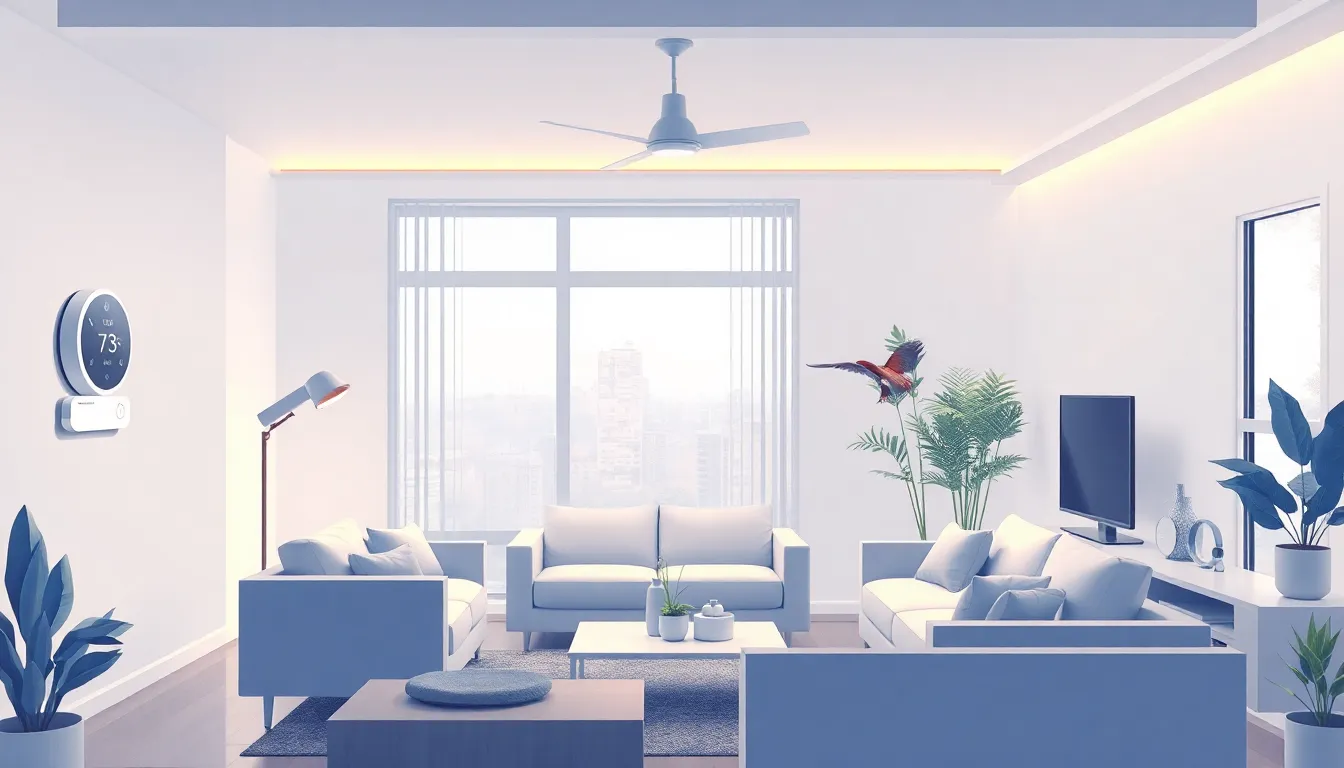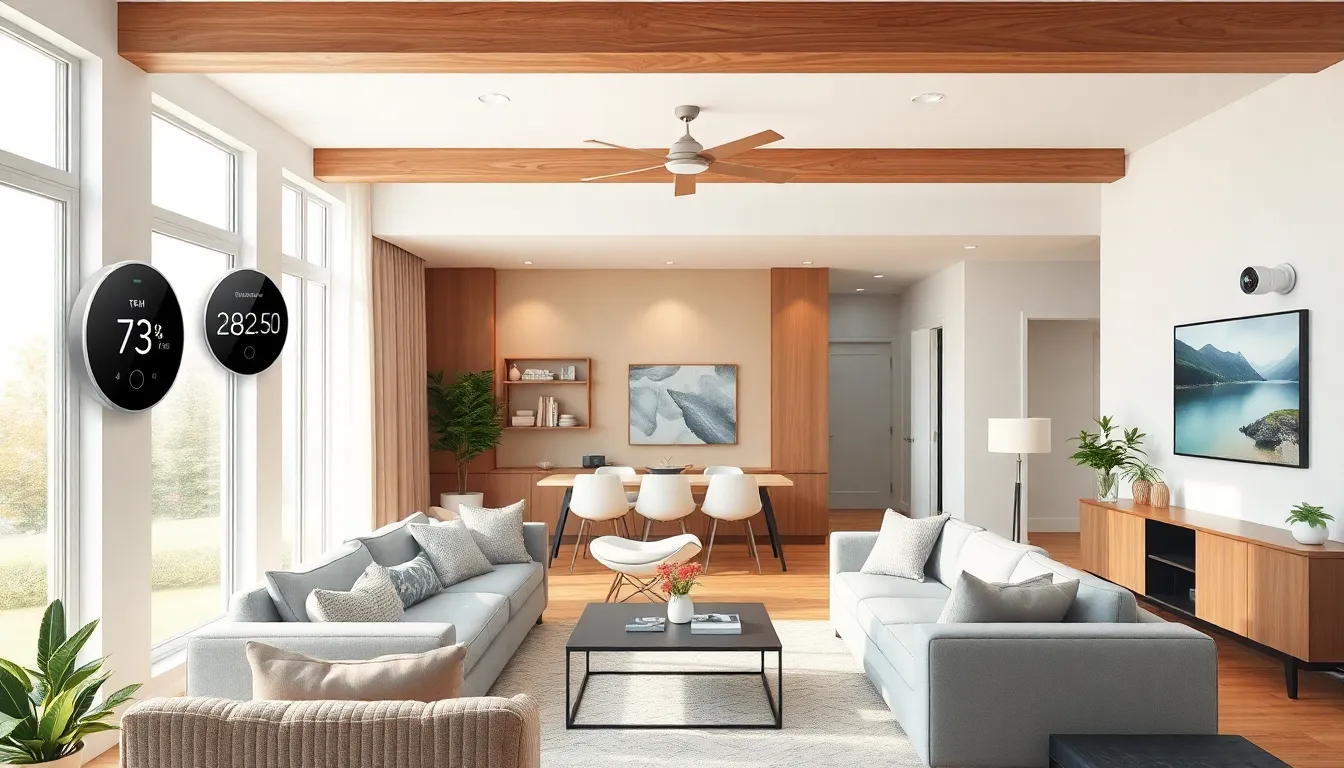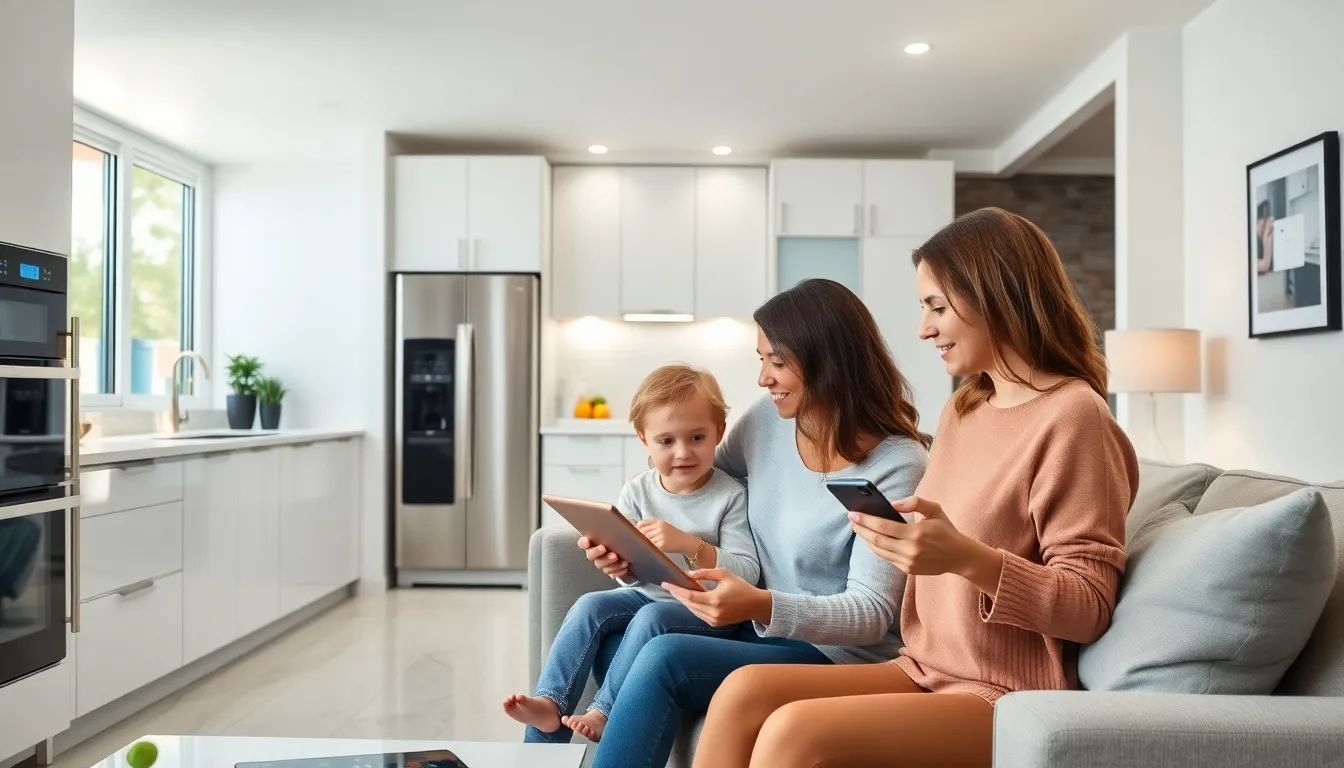Imagine walking into your home and having it greet you like an old friend. Smart homes aren’t just a trend; they’re the future of living. With advanced technology at your fingertips, everyday tasks become a breeze. Want to dim the lights without getting off the couch? Done. Need to adjust the thermostat while still in bed? Easy peasy.
Table of Contents
ToggleOverview of Smart Homes
Smart homes integrate advanced technology to enhance daily living. These residences utilize connected devices to automate tasks, increasing convenience and efficiency. Homeowners manage everything from lighting to security systems through smartphones or voice commands.
Many smart homes come equipped with features like smart thermostats, which learn user preferences and optimize energy consumption. Voice-activated assistants streamline daily routines, enabling users to check schedules or control appliances hands-free. Energy efficiency remains a significant benefit, with smart devices reducing waste and lowering utility bills.
Security systems in smart homes include cameras, motion detectors, and alarms that homeowners can monitor remotely. Enhanced safety options provide peace of mind, especially for families. Moreover, integrating smart locks makes securing entries more straightforward.
Connectivity serves as a key element in these homes, with Wi-Fi ensuring devices communicate seamlessly. Homeowners often prioritize compatibility with multiple devices, allowing them to create customized ecosystems. Additionally, increasing demand for smart home technology drives innovation, making advanced features more affordable.
Locations with smart homes usually attract buyers looking for modern conveniences. Market data indicates a steady rise in smart home sales, reflecting their growing popularity. Living in a smart home means embracing a future focused on technology, sustainability, and comfort.
Benefits of Smart Homes



Smart homes offer numerous advantages that transform daily living. They improve convenience and foster a seamless lifestyle.
Increased Energy Efficiency
Smart devices optimize energy usage effectively. Smart thermostats learn user preferences, adjusting temperatures automatically. This technology can save homeowners 10 to 30 percent on energy bills. Smart lighting systems operate on schedules or sensors, minimizing unnecessary energy waste. Homeowners can monitor energy consumption through apps, providing real-time insights. These features contribute to reduced environmental impact while lowering utility costs. Increased energy efficiency becomes a primary selling point for potential buyers.
Enhanced Security Features
Smart home security systems improve safety significantly. Homeowners can monitor properties through cameras and motion detectors remotely. Alerts sent directly to smartphones provide immediate awareness of unusual activity. With features like smart locks, users can control access from anywhere and grant temporary entry to guests. Integration with alarms increases protection, deterring potential intruders. Enhanced security measures offer peace of mind, appealing to families and individuals alike. Therefore, homebuyers prioritize properties with advanced security features.
Types of Smart Homes for Sale
Smart homes for sale come in various forms, catering to the diverse needs of modern buyers. Each type offers unique features and automation levels, enhancing convenience and security.
Fully Automated Homes
Fully automated homes represent the pinnacle of smart living. These residences integrate an extensive array of connected devices that communicate effortlessly, allowing for automated control over lighting, security, climate, and entertainment systems. Homeowners can adjust settings remotely through smartphones or tablets, ensuring comfort and efficiency without manual intervention. Advanced features learn user preferences, predicting needs and adjusting environments accordingly. Many fully automated homes include AI-driven systems that optimize energy consumption, targeting reductions in utility bills by 10 to 30 percent. Buyers looking for cutting-edge technology favor these homes for their seamless integration and enhanced lifestyle benefits.
Smart-Enabled Single-Family Homes
Smart-enabled single-family homes strike a balance between technology and traditional living. These homes incorporate essential smart devices like smart thermostats, security systems, and lighting controls, providing occupants with convenient management options. Owners can experience improved energy efficiency through programmable settings, as smart devices automatically adjust according to user habits. Buyers appreciate the enhanced security features offered by smart locks and monitoring cameras that provide alerts and remote access. While these homes may not be fully automated, they still offer significant advantages for those seeking smart solutions in everyday life. The appeal lies in the flexibility to integrate additional devices as needs evolve.
Key Features to Look for
When considering smart homes for sale, buyers look for specific features that enhance the living experience. These features promote efficiency and security while providing convenience.
Smart Thermostats and Lighting
Smart thermostats play a critical role in optimizing energy usage. They learn preferences and adjust temperatures autonomously, significantly cutting energy bills by 10 to 30 percent. Lighting systems can adapt through schedules or motion sensors, ensuring lights only operate when necessary. Many systems allow homeowners to control lighting remotely via smartphones. Energy savings and personal comfort remain top priorities for buyers seeking eco-friendly solutions.
Home Security Systems
Home security systems represent a vital component of smart living. Remote monitoring through cameras and motion detectors improves safety and offers instant alerts for unusual activity. Smart locks provide users with the ability to manage access from anywhere, enhancing overall protection. Many homeowners prioritize security features that deter potential intruders. Peace of mind correlates directly with homes equipped with advanced security technology.
Pricing and Financing Options
Pricing for smart homes varies widely based on features, location, and market trends. Properties with advanced automation typically range from $300,000 to over $1 million, depending on the level of technology integrated. For instance, fully automated homes often demand higher prices due to their extensive capabilities.
Financing options play a crucial role in making smart homes more accessible to buyers. Conventional mortgages remain a popular choice, with interest rates currently averaging around 3 to 4 percent. Some lenders offer special loans tailored for energy-efficient properties, allowing buyers to finance the cost of advanced technology through their home loans.
Government incentives also enhance affordability. Tax credits for energy-efficient upgrades can offset initial costs, making smart home purchases appealing. Certain states provide rebates for smart devices that contribute to energy savings, allowing homeowners to recover some expenses.
Leasing options are increasingly popular for those hesitant about upfront costs. Smart technology can often be leased, allowing homeowners to experience all features without committing to total purchase prices. Monthly payment plans simplify budgeting by spreading the cost over time.
Investments in smart technology often yield substantial long-term savings. Homeowners can save 10 to 30 percent on energy bills, creating a more attractive financial scenario. Additionally, homes with advanced security features frequently see higher resale values, as the demand for smart homes continues to grow.
Ultimately, understanding pricing and financing options empowers buyers to make informed decisions. As smart home technology evolves, opportunities for potential homeowners increase, making the transition to smart living not only desirable but also financially viable.



